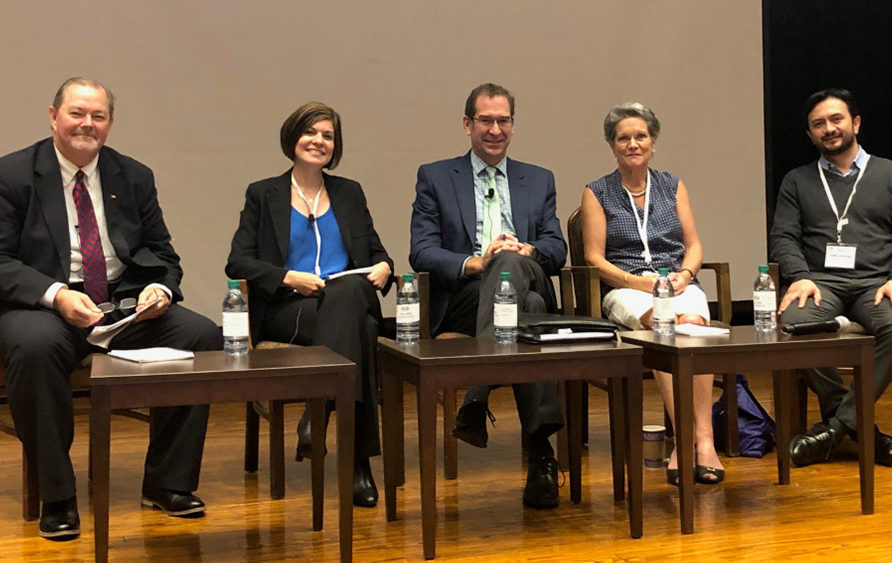Eddie Pesántez, Undersecretary of Livestock Production, participated in the Ninth Global Agenda for Sustainable Livestock that was held in Kansas, USA, last September. As part of “Innovative sustainable livestock systems”, he stated that Ecuador plans to develop a comprehensive, participatory management framework for the chain to transform planning and conventional livestock systems into sustainable systems with the goal of reducing Greenhouse Gas emissions to reduce the rate of deforestation in the country and provide opportunities for mitigating and adapting to climate change.
Quito, September 10, 2019.- Ecuador is participating in the ninth Annual Global Agenda for Sustainable Livestock that takes place until Friday, September 13, at the Kansas State University, Manhattan, United States, where the progress made will be presented by participating countries from all regions of the world.
Eddie Pesántez, Undersecretary of Livestock Production of the Ministry of Agriculture and Livestock is participating in this event and took part in a panel on “The role of innovation in sustainable livestock systems.”
There, he indicated that Ecuador hopes to develop a comprehensive, participatory management framework for the chain to transform planning and conventional livestock systems into sustainable systems with the goal of reducing Greenhouse Gas emissions to reduce the rate of deforestation in the country and provide opportunities for mitigating and adapting to climate change.
During his presentation, Pesántez noted that actions are being implemented in Ecuador to improve livestock health, reproduction and genetics, soil management, production and conservation of pastures and forage, implementation of silvopastoral systems and animal nutrition, with a focus on sustainable production through the National Sustainable Livestock Project run by the Ministry of Agriculture and Livestock (MAG), which is one of several initiatives that are underway.
He also presented the Amazon Productive Transformation Agenda (ATPA), which is implemented in six provinces of the Ecuadorian Amazon and is responsible for promoting the Reduction of Emissions due to Deforestation and Forest Degradation (REDD+), product certification and traceability, as well as multi-stakeholder coordination platforms that enable the delivery of deforestation-free agricultural products.
Meanwhile, the Climate-Smart Livestock Project implemented through FAO by MAG and the Ministry of Environment (MAE), seeks to sustainably increase productivity and income, make producers resilient to climate change and reduce Greenhouse Gas emissions due to livestock activities.
The country is also implementing the PROAmazonía Project between MAG and MAE with the support of the Global Environment Fund (GEF) to promote financial and land use planning instruments to reduce emissions from deforestation, and with the Green Climate Fund (GCF), the integrated management of multiple-use landscapes with high conservation value for the sustainable development of the Ecuadorian Amazon Region.
Pesántez noted that livestock provides income for millions of people, so a change in production systems needs to be developed and promoted. He stated that improving productive efficiency involves challenges such as political will, adequate laws, environment and soft loans suitable for livestock production.
He mentioned that the National Government, through MAG, hopes to balance productive diversification to avoid negative impacts on small producers by strengthening agrosilvopastoral systems, diversifying income with timber, fruit and forage, and through the collection, transformation, marketing, sale, traceability and certification of deforestation-free products and good sustainable practices, which will allow us to be competitive in the markets with differentiated products. Pesántez participated in this panel together with Michelle Calvo-Lorenzo, technical consultant in Animal Welfare; Nicola Shadbolt, Professor of Agricultural Management and Agribusiness at Massey University; Nick Austin, director of the Melinda Gates Foundation and Agricultural Development Project; and Scott Hutchins, Deputy Under Secretary for Research, Education and Economics –USDA-.
Date: September 10, 2019
 Español
Español English
English
